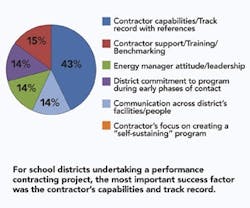Especially in tough economic times, building owners who want to undertake energy projects may be limited to those that require no or limited upfront investment. Performance contracting (PC), in which the upfront costs are funded over time by the resulting energy savings, is one solution that can resolve this dilemma. However, finding the right performance contractor can be complicated.
There are horror stories involving owners who lost money or paid excessively. But if you choose wisely, your initial expenses can be minimal and your facilities can profit. For the success of your facility's energy program (and your reputation), it is critical to pick the right PC firm.
The request for proposal (RFP) is a key tool for identifying the right firm, and for public facilities it is often one of the first procurement steps. In your RFP you should require descriptions of the following elements:
- The provider's main business focus and length of service in it.
- The provider's process of delivering the services and verifying the results.
- The provider's ability to measure and compare the performance of your facilities against benchmarks.
- At least seven references (with contact names and phone numbers) involving projects with a similar scope of work/services in similar facilities and climates. The provider should also state the net benefits achieved.
- The net savings for your facilities (inclusive of all costs to be paid by you). If there is a guaranteed savings, that should be listed as well.
After you receive the proposals, the questions below can help you evaluate the providers:
- How many references were provided?
- How similar are the references compared to your facility (size, location, function)?
- Does the provider have a personal relationship with the references? A possible conflict of interest?
- How long ago did the reference work with the provider?
- Why did the reference hire the provider?
- Did the provider follow through on its commitments?
- Are the reference and the provider continuing their relationship? Is the PC program still operating?
- Would the reference hire the provider again?
Scoring the RFP's Criteria
Now you have a significant body of information that needs to be scored against your criteria. For this step, it may be helpful to consider giving more weight to the characteristics that have been identified as most important by other organizations that have already implemented energy savings programs.
Recently I did a survey of 16 school districts to identify the key success criteria when selecting a performance contractor. Although the survey was limited to school districts, the results can have meaning and application for many facility managers.
These school districts across the country have already been operating an energy conservation program for more than 2 years, and some have programs that have been in place for more than 10 years.
At the beginning of the survey, each district was asked, "If you were giving advice to another school district about selecting an energy consultant, what are the key success criteria?"
Key Success Factors
The most frequent response at 43 percent was "provider capabilities/track record with references" (see pie chart). For the large school districts with student populations greater than 20,000, this response was even higher at 80 percent. Also among large school districts, the second-ranked priority at 83% was "support/training/benchmarking."
When selecting a provider for a performance contract, keep in mind that facilities of different sizes may have different priorities on the key success factors. In addition, you should select a provider who has experience in your facility size and type so that the provider can benchmark your facility against others and make adjustments as needed. B
Eric Woodroof, Ph.D., is the Chairman of the Board for the Certified Carbon Reduction Manager (CRM) program and a board member since 1999 of the Certified Energy Manager (CEM) Program. He is a strategic advisor, corporate trainer, keynote speaker, and founder of ProfitableGreenSolutions.com.
About the Author
Eric Woodroof
Ph.D., CEM, CRM
Dr. Eric Woodroof shares simplified ways to improve sustainability and profits. His practical ways to save energy and our environment have been successful all over the world. He also shares common "worst practices" to help his clients and audiences avoid penalties.
He is the lead instructor and editor for the Certified Energy Manager Program (CEM), which is the field's most popular training in the world. He has created certifications and training programs which are endorsed by countries on 6 continents.
He has received Department of Energy Awards and is also the youngest member ever inducted into:
- The Energy Manager Hall of Fame (Association of Energy Engineers),
- The College of Engineering's Hall of Fame at Oklahoma State University.
- He also is a recipient of the Lohmann Medal, which is the college's highest merit-based alumni honor for contributions to the field.
Dr. Woodroof has trained thousands of professionals, who are now saving billions in avoided energy expenses and global pollution. He continually learns from working with these professionals, and he brings this collective knowledge back to his clients and students during his seminars and keynotes.
In 2011, Dr. Woodroof served as President of the Association of Energy Engineers, which has over 20,000 members in over 100 countries. He serves on several certification/advisory boards, and is the Chairman of the Energy Management Professional Council.
